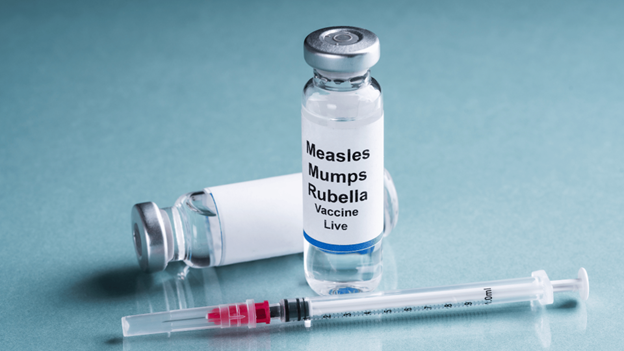
Measles outbreak: recognizing measles rash and its implications.
As measles outbreaks occur, it is important to understand the signs and know when to act.
This guide will walk you through the symptoms of measles, focusing on its distinctive rash and how to get vaccinated for measles.
Measles and its signature rash.
Measles is a highly contagious disease characterized by outbreaks, especially in areas with insufficient vaccination coverage. It starts with a high fever, and soon after, more severe symptoms kick in. Catching it early is key to keeping yourself and others safe.
Early this year, New York City reported only a handful of measles cases.
But even with just a few measles cases in New York, measles is no small worry. It’s one of the most contagious diseases out there—it travels through the air when someone coughs or sneezes and can linger even after the ill person has left the room. Just one case can lead to dozens more, particularly in places like NYC, where people are always coming and going.
Understanding the measles rash.
The rash that comes with measles usually shows up three to five days after the first signs of being sick. It starts on the face and upper neck and spreads down the body. It might look like flat red spots and can get bumpy and even join together as it spreads.
Recognizing this rash quickly helps healthcare providers like us at CityMD keep the outbreak under control and minimize the spread.
Measles rash: characteristics and early signs.
Spotting measles early on can help prevent a major outbreak, especially in densely populated areas like ours.
Here’s what to keep an eye out for.
Early signs of measles.
- High fever. This can soar to over 104 degrees Fahrenheit before the rash even appears.
- Cough, runny nose and conjunctivitis. These symptoms usually tag along with the fever.
- Koplik spots. Small white spots inside the mouth are big red flags for measles before the rash pops up.
If you're seeing these signs, especially if you or your kids haven’t been vaccinated, getting checked out is vital.
What is a measles outbreak?
A measles outbreak occurs when the highly contagious measles virus spreads within a community, especially among unimmunized people.
How do measles outbreaks start?
Outbreaks can kick off with just one person contracting measles.
Here’s a look at how that can unfold.
- Initial case. Often, an outbreak begins when someone picks up the virus while traveling abroad in areas where measles is still common. They return to the U.S. with the virus, which might not even show symptoms initially since measles has an incubation period (the time from exposure to symptom onset) of typically 10 to 14 days. This period allows the virus to go unnoticed initially, making it a problem.
Measles spreads particularly quickly in communities with low vaccination rates. Each infected person can easily pass the virus to others who aren't immune, sometimes before they even know they're sick themselves.
Local health strategies for measles outbreaks.
- Monitoring and containment. At CityMD, we stay connected with local health departments to keep tabs on measles cases and help contain any outbreaks quickly through immediate response and public education.
- Community outreach. We also work hard to spread the word about the importance of vaccinations and how to spot measles early to prevent outbreaks from spreading.
Preventing measles: vaccines and public health strategies.
The best way to fight off measles is by getting vaccinated. The measles, mumps, and rubella (MMR) vaccine is your best defense against getting sick.
At CityMD, we don’t just treat you when you’re sick—we’re here to help prevent illness before it starts. We recommend keeping your vaccinations up to date, especially for measles:
- MMR vaccine. This vaccine is your best defense against measles. Kids should get two doses, first at 12-15 months and then at 4-6 years old. Adults should ensure their vaccinations are current, especially if traveling.
- Stay informed. Keep an eye on local health news, especially if you plan to travel. If there's a measles case nearby, or if you plan on traveling to a place where measles is common, consider checking your immunity status and discussing preventative steps with a healthcare provider at CityMD.
How CityMD can help with measles.
Do you think you’ve been exposed to measles or are showing symptoms? Don’t worry—CityMD is here to help. Stop by any of our urgent care locations. We’re here to evaluate your symptoms, offer advice, and provide the MMR vaccine if needed.
Come see us at CityMD if you’re concerned about measles or need your vaccine updated. We’re here to help keep you and our communities safe and healthy.

We’re ready to care for you.
Visit any CityMD urgent care location in your community today for an evaluation with one of our expert providers.